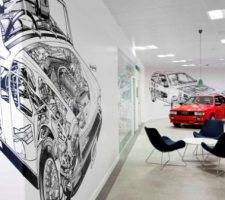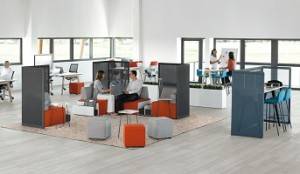November 13, 2014
Case Study: AutoTrader motors into its new Manchester digital playground
 Even in the context of a rapidly declining print market, the decision to end AutoTrader’s 37-year history as a printed magazine was not an easy one to take. At its height, Auto Trader had a circulation of 368,000, but in June 2013 the final printed copy rolled off the presses and the business began its new incarnation as a purely digital platform. Of course, this transformation was a long time in the making and had actually begun ten years earlier. By the time the print room lights went out, all of Auto Trader’s revenues had not only migrated online, but experienced significant growth too. It is Auto Trader’s growth during this process of transformation that is considered so unique in the publishing world and is proof that the business’ aspiration to be at the forefront of the digital marketplace is not just a wide-eyed intention. The website boasts 11.5million unique users, carrying out more than 140 million searches across mobile, table and desktop devices and the business is set to launch an extensive TV advertising campaign on boxing day.
Even in the context of a rapidly declining print market, the decision to end AutoTrader’s 37-year history as a printed magazine was not an easy one to take. At its height, Auto Trader had a circulation of 368,000, but in June 2013 the final printed copy rolled off the presses and the business began its new incarnation as a purely digital platform. Of course, this transformation was a long time in the making and had actually begun ten years earlier. By the time the print room lights went out, all of Auto Trader’s revenues had not only migrated online, but experienced significant growth too. It is Auto Trader’s growth during this process of transformation that is considered so unique in the publishing world and is proof that the business’ aspiration to be at the forefront of the digital marketplace is not just a wide-eyed intention. The website boasts 11.5million unique users, carrying out more than 140 million searches across mobile, table and desktop devices and the business is set to launch an extensive TV advertising campaign on boxing day.



















November 19, 2014
Worktech 14 London focuses on wellbeing, wherever we choose to work
by Sara Bean • Comment, Events, Facilities management, Flexible working, Wellbeing
The variety of ways in which technology can help us thrive at work was one of the key themes of the first day of Worktech 14, which also provided yet more evidence that the workplace is no longer based in any one place. There were some interesting ruminations on the changing values of the workplace, which included the challenges of managing mobile working and its wider effects on our wellbeing; a topic that merited a whole series of sessions, including, how office design can aide brain function; analysing the psychological effects of the ‘always on’ culture and the role of the employer in combating the rise in western obesity. Meeting room no-shows run at around 35% for most companies and in an illuminating co-presentation on estates utilisation with Condeco, Bruce Everest of Vodafone described how the mobile giant has transformed its offices into collaborative space. There were also some thought provoking sessions that peered into the future, including the statement by a speaker from none other than Intel that ‘technology alone is not our salvation’ and a fascinating glimpse into the workplace of 2040 provided by Marie Puybaraud of Johnson Controls. (more…)